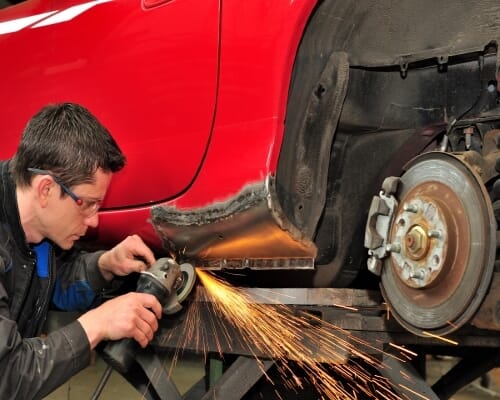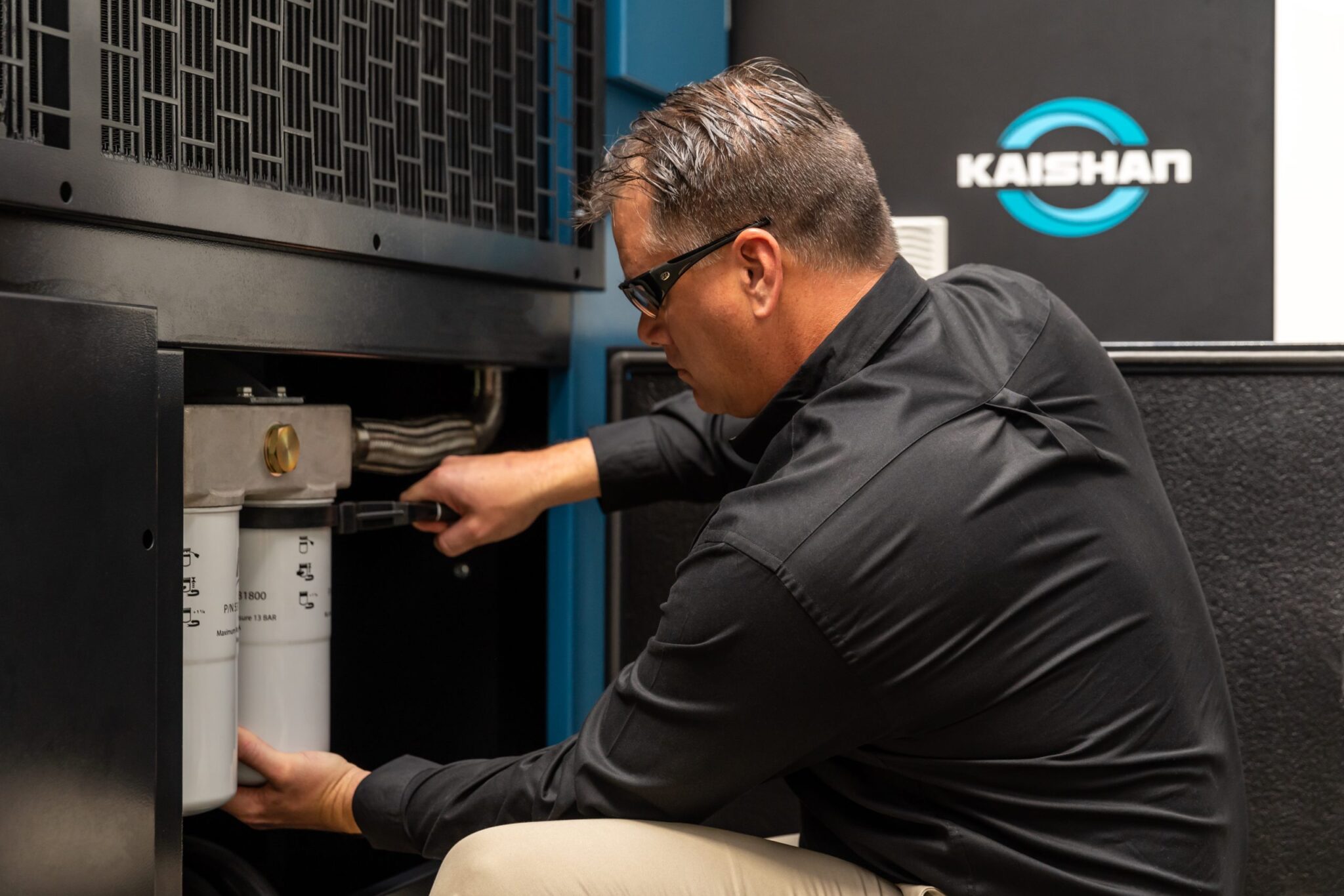
Improve Efficiency with a Belt-Drive Air Compressor
November 10, 2022
How to Find and Stop Air Leaks
November 23, 2022AIR COMPRESSOR MAINTENANCE
Kaishan USA | November 16, 2022 | Uncategorized
Maintaining your air compressor is sometimes overlooked in today’s busy enterprises. But it pays both short-term and long-term benefits, including the following:
-
- Uptime. By doing regular maintenance, you’ll keep downtime to a minimum. Especially unplanned downtime, which can have extremely negative consequences. According to one study, unplanned downtime costs manufacturing enterprises as much as $260,000 an hour.
- Energy efficiency. A properly maintained air compressor will deliver significant energy savings throughout the life of your system. An important rule of thumb: even a two-PSI reduction in compressor performance will raise your energy consumption by an average of 1%.
- Equipment life. A well-maintained compressor will have a long working life and could well impact the longevity of the equipment it services. And avoid catastrophic failures that could result in significant repair and replacement costs.
- Safety. Properly maintaining rotary screw air compressors will lessen the heat, vibration, pollution and noise impact on your people. And they are less likely to have the kinds of serious failures that injure workers.
What clearly works the best is establishing a consistent maintenance program that you should follow religiously. Doing so will ensure you deliver high-quality compressed air, save money and prolong the life of your air compressor and the other components in your air compression system. And perhaps even add to the service life of the equipment you’re powering.
To set up a compressor maintenance plan, we recommend that you take the following actions:
-
- Assign tasks, outlining clearly who on your team is to do what and when.
- Record key data and track it, so a loss of performance can be quickly identified.
- Make repairs promptly when a problem is uncovered.
- Call in a professional any time you’re not comfortable with what you’re finding.
According to recent research, many companies are finding that they no longer have the expertise in-house to deal with the complexities of today’s advanced equipment like air compression systems. We strongly advise companies to seek outside help when problems arise to avoid serious problems (more on this at the end of this blog entry).

Many companies no longer have the expertise in-house to maintain equipment like today’s rotary screw air compressors.
What follows below is a brief snapshot of the air compressor maintenance issues you need to keep in mind.
Air Filtration
We often forget that room air contains millions of particles of dust, water vapor and pollutants. When you compress that “normal” air into a smaller space, you are also squeezing in those contaminants.
When they’re compressed, those particles can block lines, make it difficult to open and close valves and drains and cause unnecessary wear and tear on all the equipment in an air compression system.
That’s why it’s so important to remove contaminants, filtering them out at every stage of the process.
Inlet Filter Cartridges
The inlet filter cartridge removes airborne contaminants as the compressor sucks in air. As a result, it accumulates dirt and grime, eventually losing effectiveness. So it’s smart to clean the vents weekly and replace the filter as recommended by your compressor manufacturer. We generally recommend that you clean or replace them at a maximum of 4,000 hours or when the air filter alarm is flashing.
Air Line Filters
Air line filters are designed to remove solid particles, vapors or aerosols from the air after it leaves the compressors and the air compressor dryers. These filters force the air through sharp turns and tight spots. Some use fiber filters to trap solid materials. Others, called coalescing filters, grab and gather liquid. And absorption filters use carbon or other media to snag lubricants and other compounds.
Follow the manufacturer’s guidance to determine how often you should replace these filters. But rather than simply watching the calendar, you should really be paying attention to your filter and replace it when it appears that compressor performance has been compromised. Remember the two-PSI-for-1% rule.
The ultimate solution is to install differential pressure gauges on your filters to monitor the pressure drop. They will give you a visual indication that the filter should be changed.
Drain Traps
Moisture separators capture the liquid that condenses after the air compressor’s aftercooler chills the air. That liquid flows into drain traps, causing scale, rust, dirt and any other solid materials to accumulate. These contaminants then build up and can cause the drains to become stuck, allowing air to escape and pressure to drop if the drain gets stuck in the open position. Conversely, those liquids will stay in the air and move downstream if the drains are locked in a closed position. That’s why you need to inspect and clean drains regularly.

You’ll want to set up a consistent maintenance program you follow religiously.
Motor Bearings
You'll want to give your compressor’s motor bearings a little extra TLC. Remember, they need to rotate frequently to allow the compressor to run smoothly and do its job converting electricity into the energy that runs your compressed air system. Grease protects motor bearings from the heat and friction that could eventually damage them and prevent them from rotating freely, which, in turn, could shorten motor life.
Check with the compressor manufacturer to find out how often you should grease your compressor’s motor bearings, how much, and what type of grease is required.
Oil
Oil plays an important role in the life of your compressor. In fact, we call it the lifeblood of your machine. Obviously, it reduces the friction among all the moving parts, also reducing the heat buildup. That’s why it’s so important to follow your manufacturer’s guidelines and choose the right oil for your rotary screw air compressor.
We also highly recommend that you adhere to a scheduled oil analysis program that will monitor the condition of your oil and alert you of contaminants that can severely harm your compressor, causing major expense and downtime. Lubrication is not the place to cut corners and save a few pennies!
The oil in your compressor will experience a steady decline over time, as droplets get absorbed into the air and either escape or are removed by the air filters and drainage system. As a result, you should check the oil level before starting your compressor each day, using either the dipstick or sight glass.
If the level has dropped, it is critical that you take care when refilling the oil. Naturally, you will want to replace what’s been consumed; running your compressor without enough oil will damage key components, causing premature wear and shortened motor life.
But you also want to be careful that you don’t over-lubricate, causing maintenance issues and excessive wear to the rotating assembly. Make sure to remove excess oil prior to restarting your compressor.
Over time, any oil begins to break down and needs to be changed. Once again, you’ll want to consult your manufacturer to determine how often you need to change the oil. You’ll need to calculate the hours of operation, motor speed and other key operating conditions to finalize an appropriate maintenance schedule. One important note: doing regular oil sampling as part of the oil change will be a great help in monitoring your oil quality (more on this below).
If you suddenly find your compressor is using more oil than normal, you may need to seek expert help. Excessive oil use could be an indication of a problem: oil might be leaking somewhere. Or the operating temperature may be too high.
Remember, fluids are typically rated at 8,000 hours, assuming the compressor is operating at 185°F. And the higher the temperature, the faster your compressor oil ages. So, If it’s at 200°F or 220°F, the oil in your compressor will age prematurely.
Oil Filters
Many compressors have an oil filter to remove metal filings, calcium and other materials in the oil. Filtering these contaminants out of the oil will prolong its useful life.
There should be instructions from the manufacturer on the frequency. If not, you should probably replace them every 2,000 hours. You’ll want to change your separator annually or when the separator pressure alarm is energized.

Our network of independent distributors can handle any air compressor service request to ensure reliable operation of your equipment.
Fluid Sampling
We recommend that you capture a fluid sample on a regular basis and have it analyzed. A certified lab will give you a comprehensive report with a detailed analysis and a list of recommended steps to address any issues the analyst identifies.
You probably will need to do fluid sampling to keep your manufacturer’s extended warranty in place. As a matter of fact, Kaishan requires fluid sampling for our extended warranties.
Preventive Maintenance
The only thing better than fixing problems as they occur – and they will – is anticipating and preventing them before they happen. Many experts make the analogy to the routine maintenance we do with our cars.
Just as regular automobile service improves the performance and lengthens the life of an important family asset, preventive maintenance assures top-quality air compression and increases the life of a mission-critical piece of equipment in your operation.

From airends to check valves, our warehouse is stocked with all of the parts you need to keep your air compressor systems up and running.
The goal, of course, is to anticipate problems before they happen, thus lessening the times when unplanned compressor problems lead to a shutdown. And it pays for itself in lower service and replacement costs, reduced energy consumption (not to mention lower utility bills) and fewer costly shutdowns, resulting in lost production and possibly even labor and overtime costs. According to industry research, a proactive maintenance strategy can help you reduce maintenance costs by as much as 70%.
And while some may argue that any shutdown is expensive, whether it’s scheduled or not, we’ve always found that planned maintenance is more efficient and less traumatic than a shutdown.
Consulting Help
When all else fails, it’s wise to bring in professional help for the most serious issues. Kaishan is fortunate to work with a nationwide network of independent distributors, who can provide on-site help and consultation as needed. These factory-trained air compression experts have an investment in their local communities and can service your air compressor system without a problem.

In our experience, a proactive maintenance strategy can help you reduce maintenance costs by as much as 70%.
Key Takeaways
-
- Air compressor maintenance pays for itself in increased uptime and energy efficiency, longer equipment life and greater safety.
- What works best? Establishing a consistent maintenance program that you should follow religiously.
- Lubrication is not the place to cut corners and save a few pennies.
- A proactive maintenance strategy can help you reduce maintenance costs by as much as 70%.
- For the most serious issues, Kaishan’s nationwide network of independent distributors, can offer professional help.
Let Us Help
Maintaining your rotary screw air compressor is absolutely critical to the operation, not only of your compressed air system but also of all the processes that rely on that system. If you need help setting up a maintenance program that works for you, get in touch with the experts at Kaishan. Contact us today.
Random stat or
customer quote
textXXtext
text
Maintaining your air compressor is sometimes overlooked in today’s busy enterprises.

